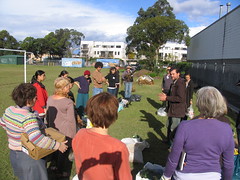 |
| English: Worms Hovels. The remains of the former dwellings are now used for sheep farming. (Photo credit: Wikipedia) |
 |
| Compost making class (Photo credit: Milkwooders) |
 |
| Compost making class (Photo credit: Milkwooders) |
A worm's body is made up of 70-95 percent water. Worms therefore require a very moist environment that should be mimicked in the worm farm. When worms die, they often shrivel up and go unnoticed as the water content is lost at this point.
These are cold blooded animals. Temperature should be maintained between 72 and 75 degrees Fahrenheit to assist the regulation of their body temperatures. Worm farms should be placed in a location that allows for this constant temperature, or bins that are insulated should be purchased.
One focus of worm farming is to have worms that will reproduce easily. Worms are hermaphrodites, meaning they possess both male and female sex organs. Worm farmers must realize that although they are hermaphrodites, they cannot self-fertilize. A single worm cannot reproduce alone. A colony of many worms will result in larger numbers being produced.
Worms used in worm farms are covered in a slimy mucus coating. This coating serves many purposes. The mucus helps the worms retain water. As their bodies are made up of a high percentage of water, an important step when worm farming is to be sure to provide adequate moisture levels in the bin. The worm will be able to hold in the required moisture level through this mucus coating.
The worm's mucus coating is also a protector. As the worm borrows into soil and bedding, the mucus provides a slick coat protecting it from harmful substances that may reside there.
The anatomy of the mouth of the worm is regarded as unique. In the worm, the mouth is called the Peristonium. Worms do not have teeth. Instead they have this mouth organ that is used for prying. Worm farmers should be aware that worms will be able to better compost food items that have been cut down into smaller pieces. Soaked paper and cardboard products will be more easily pried apart than hard, non-soaked pieces.
Established worm farmers and those new to the hobby are often surprised to learn the life span of the worms that are commonly used in worm farming. The common lifespan of these worms is typically between 4 and 8 years. It has been reported that some worms have been known to live over 15 years.
These are long lived creatures whose lives are most often cut short by accidents. The myth that worms can be cut in half and therefore produce two worms is false. Worm farmers should always be careful when searching for worms, replacing bedding or removing vermicompost. Sharp or hard tools are likely to injure a worm or even cause death.
If provided a good diet, proper living conditions and a safe environment, worms can live long healthy lives. Healthy worms produce healthy compost that can be put to good use. Understanding the basics of the anatomy of these worms will aide in the understanding of how unique they are and how to address their needs.










